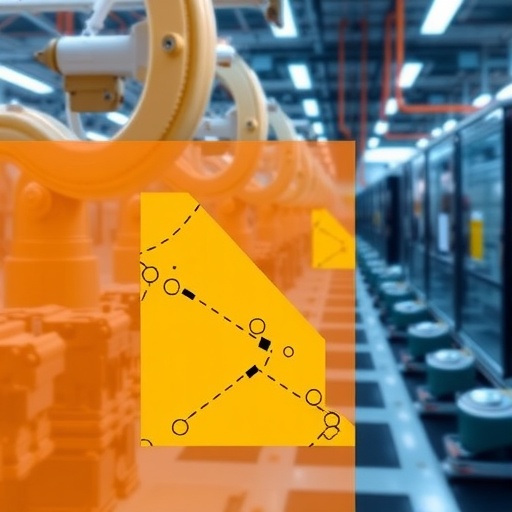KAIST Unveils Revolutionary AI Technology for Defect Detection in Smart Manufacturing
In recent years, the integration of artificial intelligence (AI) into manufacturing processes has transformed operational efficiencies and quality control standards across industries. However, a significant challenge has surfaced: when manufacturing conditions change—whether due to machine replacements or fluctuations in environmental factors like temperature, pressure, and speed—the existing AI defect detection models often falter, leading to inaccurate outcomes. KAIST, South Korea’s prestigious Korea Advanced Institute of Science and Technology, announced groundbreaking advancements in this realm, paving the way for a new era of robust and adaptable AI in manufacturing.
KAIST’s research team, under the guidance of Professor Jae-Gil Lee from the School of Computing, has developed innovative “time-series domain adaptation” technology. This new method enhances the durability and performance of AI models, enabling them to detect defects accurately in changing manufacturing environments without necessitating retraining. Such an advancement promises to significantly reduce operational costs tied to AI deployment while broadening its applicability towards diverse fields, from smart factories to healthcare devices and urban infrastructures.
At the core of this research is a critical observation by Professor Lee’s team: existing AI models generally struggle with variations not solely due to differences in data distribution but also owing to alterations in defect occurrence patterns—the so-called label distribution. In manufacturing contexts, especially in semiconductor production, the prevalence of different defect types can change as a result of equipment upgrades or modifications; thus, a standard model may become obsolete under new manufacturing scenarios.
To tackle these hurdles, the research team devised a method to dissect incoming process sensor data into three distinctive components: trends, non-trends, and frequencies. This approach allows the AI to evaluate individual characteristics of data points similarly to how human operators detect anomalies by listening to diverse sound patterns or monitoring vibrations in machines. This multi-dimensional analysis equips the AI to maintain consistent performance even amid environmental transformations.
The culmination of their research has led to the creation of TA4LS, which stands for Time-series domain Adaptation for mitigating Label Shifts. This innovative technology leverages the principle of comparing existing model predictions against new data clustering information, thus facilitating automatic corrections in prediction outputs. The result is an AI that can adjust its bias away from outdated defect occurrence patterns and instead align with the nuances of the new production processes.
One of the standout features of this technology is its ease of integration. TA4LS can be attached to existing AI frameworks as an add-on module, eliminating the need for complex and resource-intensive redevelopments. This flexibility ensures that manufacturers can quickly adopt the innovation regardless of the AI technology they already employ, fostering a smoother transition into advanced defect detection systems.
During experimental trials involving four benchmark datasets reflecting changes in time-series data, the KAIST research team realized accuracy improvements of up to 9.42% over traditional methods. Remarkably, this performance enhancement was most pronounced in scenarios where modifications created steep discrepancies in label distributions. The research has provided critical evidence that the new technology can be effectively deployed even in environments producing low volumes of various products—a common challenge faced in smart manufacturing settings.
Professor Jae-Gil Lee emphasized the significance of this breakthrough, stating that overcoming the retraining dilemma has been a pivotal hurdle in the broader adoption of AI in manufacturing. He anticipates that once the technology is thoroughly commercialized, it will not only decrease maintenance costs but also markedly enhance defect detection efficiency across numerous sectors.
This transformative research was conducted in collaboration with doctoral candidates Jihye Na and Youngeun Nam, alongside LG AI Research team member Junhyeok Kang. The findings were presented at the prestigious KDD (ACM SIGKDD Conference on Knowledge Discovery and Data Mining) conference in August 2025, celebrated as one of the premier gatherings for advancements in artificial intelligence and data analytics.
The study contributes valuable insights and methodologies aimed at enhancing the resilience of AI applications in rapidly evolving industrial landscapes. The research was supported under a governmental initiative focusing on the development of original technology within the software industry, ensuring that such groundbreaking endeavors can effectively translate into practical applications that benefit a broad spectrum of industries, including healthcare and smart city infrastructures.
As industries set their sights on the future of manufacturing, innovations such as KAIST’s time-series domain adaptation technology may very well dictate the pace and success of AI integration into real-world applications. The prospect of operational systems that not only respond to change but adapt seamlessly, serves as a powerful testament to the potential futures that lie ahead in the intersection of AI and manufacturing.
This pivotal breakthrough not only stands to revolutionize defect detection but also sets the stage for deploying more sophisticated AI systems that are capable of evolving with the environments in which they function, ultimately ensuring higher standards of quality and efficiency in modern manufacturing processes.
Subject of Research: Time-Series Domain Adaptation Technology in Defect Detection
Article Title: Mitigating Source Label Dependency in Time-Series Domain Adaptation under Label Shifts
News Publication Date: 26-Aug-2025
Web References: DOI: 10.1145/3711896.3737050
References: None available
Image Credits: KAIST
Keywords
AI, Defect Detection, Smart Manufacturing, Time-Series Domain Adaptation, Assembly Line, Automation, KAIST, Technology Integration




